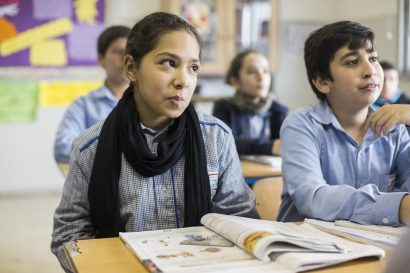Tag: quality education
 © GIZ-INEE
© GIZ-INEE
Joseph Munyambanza, a refugee from the DRC, started teaching fellow refugees in Uganda in his early teens, whilst studying at secondary school. In his keynote speech in Berlin, at “Education for a better future – creating prospects for displaced populations”, he described how he had joined with other refugee youth in his camp to form… Read more
In this journal, the article, Quality Education for Refugees in Kenya: Pedagogy in Urban Nairobi and Kakuma Refugee Camp Settings, examines the quality of education available to refugees in Kenya, with a particular focus on instruction. By providing empirical data about instruction in a refugee education context, the article supports anecdotal accounts and strengthens agency-led evaluations. It… Read more
Teachers are at the heart of the education reforms of the United Nations Relief and Work Agency for Palestine Refugees in the Near East (UNRWA). A school based programme of continuous professional development for teachers was therefore introduced in 2012. UNRWA’s School Based Teacher Development (SBTD): Transforming Classroom Practices programme reflects the importance of developing and supporting… Read more
Students in the United Nations Relief and Works Agency for Palestine Refugees in the Near East (UNRWA) schools are taught the curriculum of their host country; an agreement which has been in place between UNRWA, UNESCO and the host countries since 1954 to facilitate refugees’ access to the host countries’ secondary schools. UNRWA need to ensure that… Read more
Quality education that builds relevant skills and knowledge enables refugees to live healthy, productive lives and builds skills for self-reliance. At present, many refugees lack access to quality education that provides physical protection and personal capacity development. This is particularly true for marginalised groups, including children and young people with physical and cognitive disabilities; overaged learners… Read more
A new HEART Topic Guide on Education for Refugees and Internally Displaced Persons (IDPs) will be published in June 2016. Picking up where the seminal 2011 UNHCR Refugee Education: A Global Review left off, and adding a section on the important but under-researched topic of IDP education, the Guide will be an invaluable resource for… Read more
Drawing on research from a diverse set of countries, including the USA, Somalia, Colombia, Pakistan, Sri Lanka, and Bosnia and Herzegovina, the contributors of this volume consider the relationship between education and internally displaced persons. The case studies presented raise fundamental questions regarding the barriers to education and some unexpected benefits for displaced children. The dynamics… Read more
Children in emergency situations, especially those affected by conflict, have a wide range of educational needs depending on their context. They may have missed part or all of their education or at the very least their education has been disrupted. In addition, all children in emergencies require specific skills and knowledge to help them to… Read more
This report provides a broad review of the field of education in fragile states and charts a new agenda for maximising education’s contribution to the development and well-being of people living in these contexts. The authors find compelling evidence showing that education can play an important role for accelerating progress in fragile states for four… Read more
Providing quality educational opportunities in refugee contexts means that displaced children and youth can benefit from the protection of an accountable social service in which they have the time, opportunity and support to evolve into key actors in their own protection. Quality educational programming contributes to the development of important content knowledge, as well as… Read more
The good practices contained within these Guidance Notes are designed to help governments, non-governmental organisations and other education stakeholders plan and implement high quality education programmes. Too often in the wake of mass violence, inter-group conflicts, or natural disasters, education, and in particular quality, relevant education, is neglected and not integrated into a holistic humanitarian… Read more








